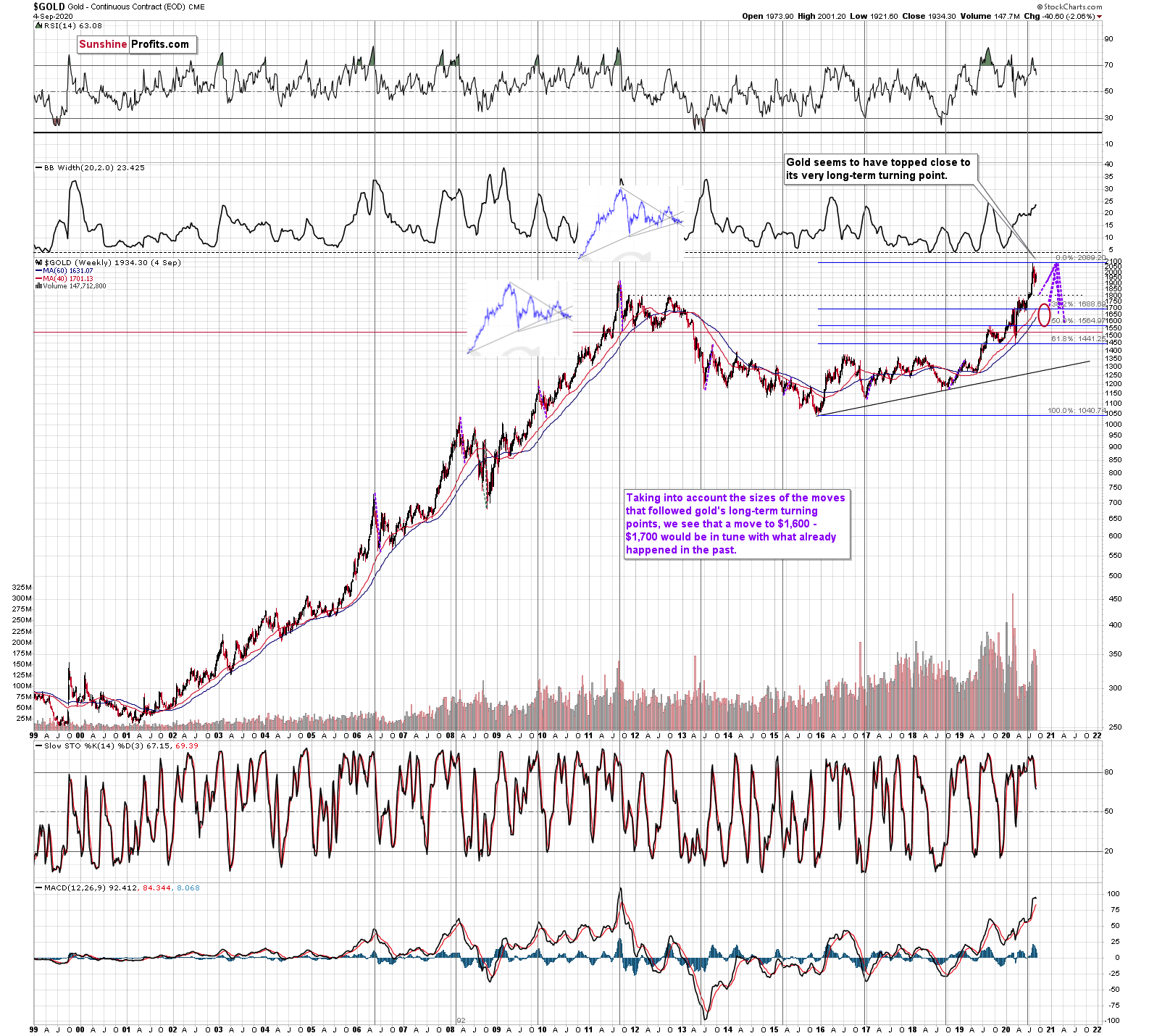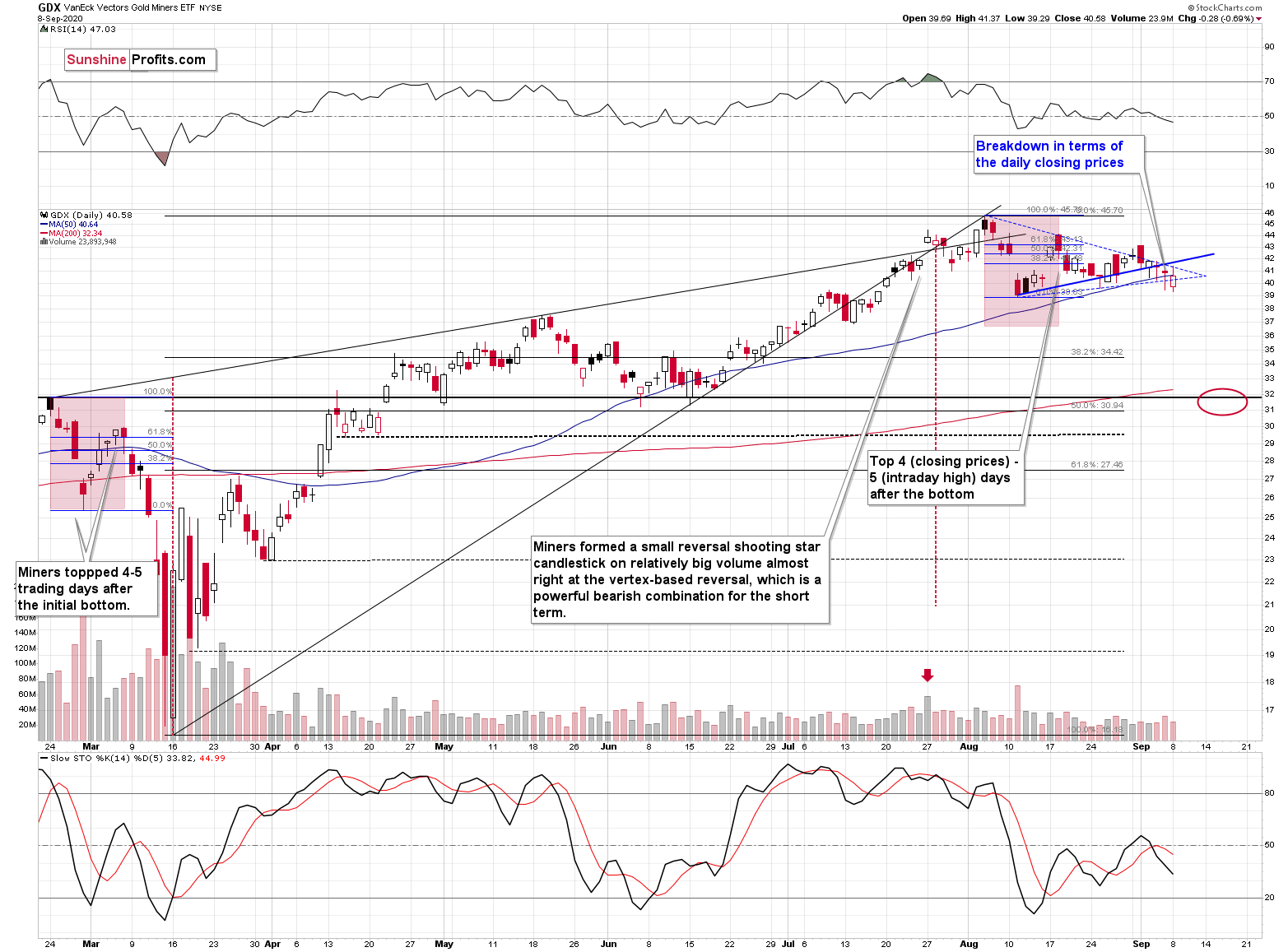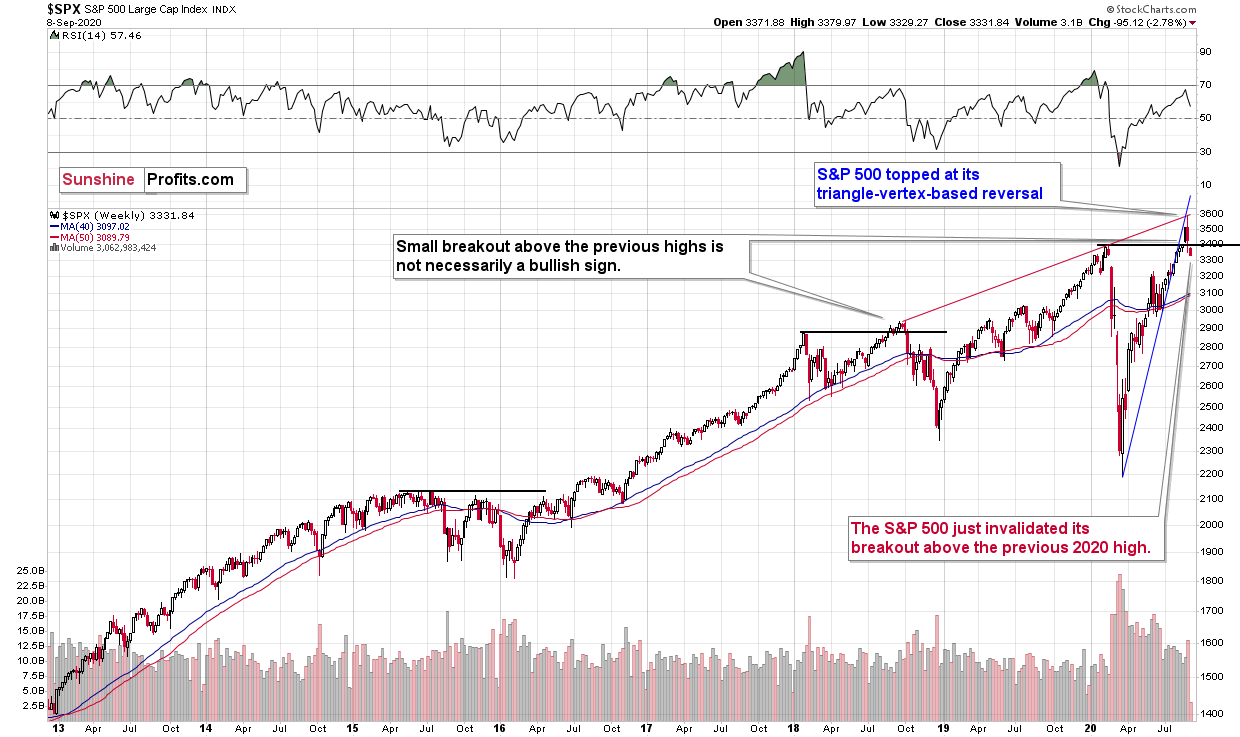Gold Price Forecast – Gold And Stock Market Lessons For The Miners

Gold doesn't exist in a vacuum, and within the love trade part there's to the king of metals, it competes with other risk-on assets such as the stock market. Let's dive into the most recent move in stocks.
The big news of yesterday’s session was that the S&P 500 invalidated its breakout above the previous 2020 high, and that happened after the Fed was even more dovish than previously. What are the implications for the precious metals market, and why didn’t gold miners decline more yesterday?
After topping at approximately the triangle-vertex-based reversal (please note how effective and versatile this technique is), stocks moved lower and ended yesterday’s session clearly below the previous 2020 high. Invalidations of breakouts are important on their own, but this development is something special. The reason is similarity to what happened in the late 2018. This is the most recent example of what an invalidation could do to the price in the matter of just several weeks. In short, stocks plunged shortly after breakout’s invalidation.
There are also other factors that need to be kept in mind, but in my opinion stocks are likely to fall in the following weeks. On a side note, if one is into stock investments at all, it might be a good idea to currently consider a market-neutral strategy based on selection of stocks that are likely to fall the most. The short position in one of our stock picks (it was NVDA) just gained almost 20% while the S&P500 fell by almost 6% during the same period.
Moving back to the precious metals market – how does the above-discussed bearish outlook translate into mining stock prices and PMs in general? In short, it has bearish implications – PMs and stocks fell together in March as well.
Ok, so why didn’t the mining stocks decline more yesterday?
Indeed, miners moved just a little lower during yesterday’s session. The GDX ETF closed the day above the lower border of the blue triangle pattern, even though it moved below it during the day. Did miners just show strength?
They both did, and didn’t. Gold ended yesterday’s session slightly higher despite the intraday decline, so the fact that miners closed the day lower is not a sign of strength.
Miners held up very well compared to the general stock market, but this is just a supplementary market for them – the most important influence comes from gold.
Consequently, it seems too early to say that miners are indeed showing strength. They are declining very slowly – just like gold is.
And it’s all happening in tune with what we wrote yesterday – gold appears to be repeating its 2013 performance but on a much shorter timeframe. The part of the move that it’s currently repeating, is a slow decline that we saw right before the plunge. Therefore, what we just saw is not odd at all – it’s normal.
Quoting our yesterday’s analysis – the part about the self-similar pattern – seems appropriate:
The history rhymes, but this time, the similarity is quite shocking.
We copied the short-term chart and pasted it on the long-term chart above and next to the 2011 top. We pasted it twice, so that you can easily compare gold’s performance in both cases in terms of both: price and time.
They are very similar to say the least. Yes, these patterns happened over different periods, but this doesn’t matter. Markets are self-similar, which is why you can see similar short-term trends and long-term trends (with regard to their shapes). Consequently, comparing patterns of similar shape makes sense even if they form over different timeframes.
After sharp rally gold declined quickly. Then we saw a rebound, and a move back to the previous low. Then, after a bit longer time, gold moved close to the most recent high and started its final decline. This decline was less volatile than the initial slide. That’s what happened when gold topped in 2011 (and in the following years), and that’s what happened also this year. Ok, after the initial decline from the 2011 top, we saw two initial reactive rallies and in 2020 there was just one, but it didn’t change the similarity with regard to time.
The patterns of this level of similarity are rare, and when they do finally take place, they tend to be remarkably precise with regard to the follow-up action.
What is likely to follow based on this pattern is that we’re likely to see the end of the slower decline, which will be followed by a big and sharp decline – similarly to what we saw in 2013.
How low could gold slide based on this similarity? Back in 2013, gold declined approximately to the 61.8% Fibonacci retracement based on the preceding rally (the one that started in 2008), so that’s the natural target also this time.
And we already wrote about this particular retracement – it’s approximately at the $1,700 level. This has been our downside target for weeks, and it was just confirmed by this precise self-similar technique.
Another interesting point is that gold made an interim low close to the 50% retracement and the previous lows. Applying this to the current situation suggests that we could see a smaller rebound when gold moves to about $1,760 - $1,800.
Summary
While stocks got clobbered, it's too early to say whether the miners showed strength yesterday. The gold self-similarity to its 2013 trading casts a vote in favor of no true strength in the miners just in. Not to mention the yellow metal, which appears poised to decline significantly.
The following days are not likely to be pleasant times for anyone who refuses to jump on the bullish bandwagon just because prices moved higher in the previous months. But what’s profitable is rarely the thing that feels good initially. As silver often moves in close relation to the yellow metal, forecasting gold’s rally without a bigger decline first is thus likely to be misleading. The times when gold is lastingly trading well above the 2011 highs will come, but they are unlikely to be seen without being preceded by a sharp drop first.
Naturally, the above is up-to-date at the moment of publishing and the situation may – and is likely to – change in the future. If you’d like to receive follow-ups to the above analysis, we invite you to sign up to our gold newsletter. You’ll receive our articles for free and if you don’t like them, you can unsubscribe in just a few seconds. Sign up today.
Przemyslaw Radomski, CFA
Editor-in-chief, Gold & Silver Fund Manager
Sunshine Profits - Effective Investments through Diligence and Care
* * * * *
All essays, research and information found above represent analyses and opinions of Przemyslaw Radomski, CFA and Sunshine Profits' associates only. As such, it may prove wrong and be subject to change without notice. Opinions and analyses are based on data available to authors of respective essays at the time of writing. Although the information provided above is based on careful research and sources that are deemed to be accurate, Przemyslaw Radomski, CFA and his associates do not guarantee the accuracy or thoroughness of the data or information reported. The opinions published above are neither an offer nor a recommendation to purchase or sell any securities. Mr. Radomski is not a Registered Securities Advisor. By reading Przemyslaw Radomski's, CFA reports you fully agree that he will not be held responsible or liable for any decisions you make regarding any information provided in these reports. Investing, trading and speculation in any financial markets may involve high risk of loss. Przemyslaw Radomski, CFA, Sunshine Profits' employees and affiliates as well as members of their families may have a short or long position in any securities, including those mentioned in any of the reports or essays, and may make additional purchases and/or sales of those securities without notice.









 Przemyslaw Radomski,
Przemyslaw Radomski,








